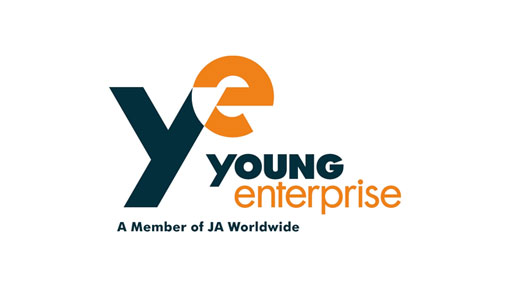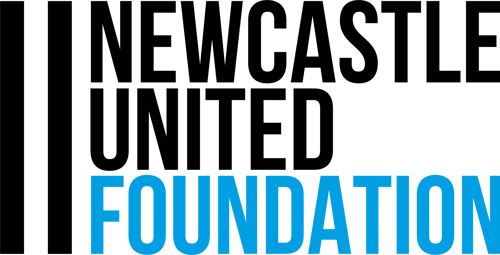
UK/EU - Design Sprint Case Study
In a collaborative design sprint with Sage Foundation, V2I partnered with Newcastle United Foundation and Young Enterprise to tackle key operational challenges. For Newcastle, the sprint focused on creating an AI-powered internal communications system to support growth, while Young Enterprise sought solutions for better data management and SDG alignment using AI. The sprint not only provided AI-powered solutions but also equipped both organizations with the tools and knowledge to drive sustainable growth, improve operational efficiency, and make a lasting impact on their communities.
PROJECT CONTEXT
V2I launched in partnership with the Sage Foundation, a virtual volunteer alliance program designed to engage Sage employees in addressing key challenges in areas such as education/training, empowerment, economic development, and building technical solutions. The main goal is to co-create solutions with nonprofit partners Newcastle United Foundation and Young Enterprise to tackle these issues effectively.
In particular, the goal of the design sprint is to support Newcastle United Foundation and Young Enterprise in developing actionable strategies that leverage AI to address their specific organizational challenges. By the end of the sprint, the teams will have:
- Newcastle United Foundation: Outlined a plan for implementing a centralized internal communications system that supports their growing capacity. The sprint will focus on identifying AI-based tools or processes that enhance internal communication and improve cross-department collaboration.
- Young Enterprise: Identified practical approaches to organizing and analyzing their data more effectively, leveraging AI to enhance capacity. The sprint will explore AI solutions that optimize data management and help align the organization’s data with strategic goals like SDG tracking.
THE CHALLENGE
The Newcastle United Foundation has experienced significant growth in recent years, leading to increased difficulty in communication between departments and team members. This new growth has made it increasingly difficult to communicate and collaborate effectively between team members. Newcastle runs into simple communication issues, like trying to advertise company/employee events. Newcastle United would benefit from an updated internal communication system to adapt to their increased capacity and make collaboration run smoother.
In that sense, the question we tackled was: How might we support Newcastle United Foundation to implement a centralized internal communications system?
On the other hand, Young Enterprise works with children and schools across the United Kingdom, generating a significant amount of data that needs to be analyzed and organized. Currently, they use multiple platforms, including Oracle, but are seeking more user-friendly tools for tracking data. Without clear data organization, they risk losing accurate feedback from their programs, hindering their growth and quality. Young Enterprise aims to maximize the value of collected data, such as identifying alignment with SDGs. This could be achieved through new technological tools like AI or by providing skills-based training for employees.
In that sense, the question we tackled was: How might we support Young Enterprise in organizing and analyzing their data more effectively to enhance capacity?
THE EXECUTION
V2I organized a one-day hybrid volunteer event in collaboration with Sage and V21 to support two UK-based nonprofit organizations—Newcastle United Foundation and Young Enterprise—through a fast-paced design sprint. Held in Newcastle with 10 volunteers on-site and another 10 joining remotely from London, the event focused on applying a human-centered approach to address real-world operational challenges.
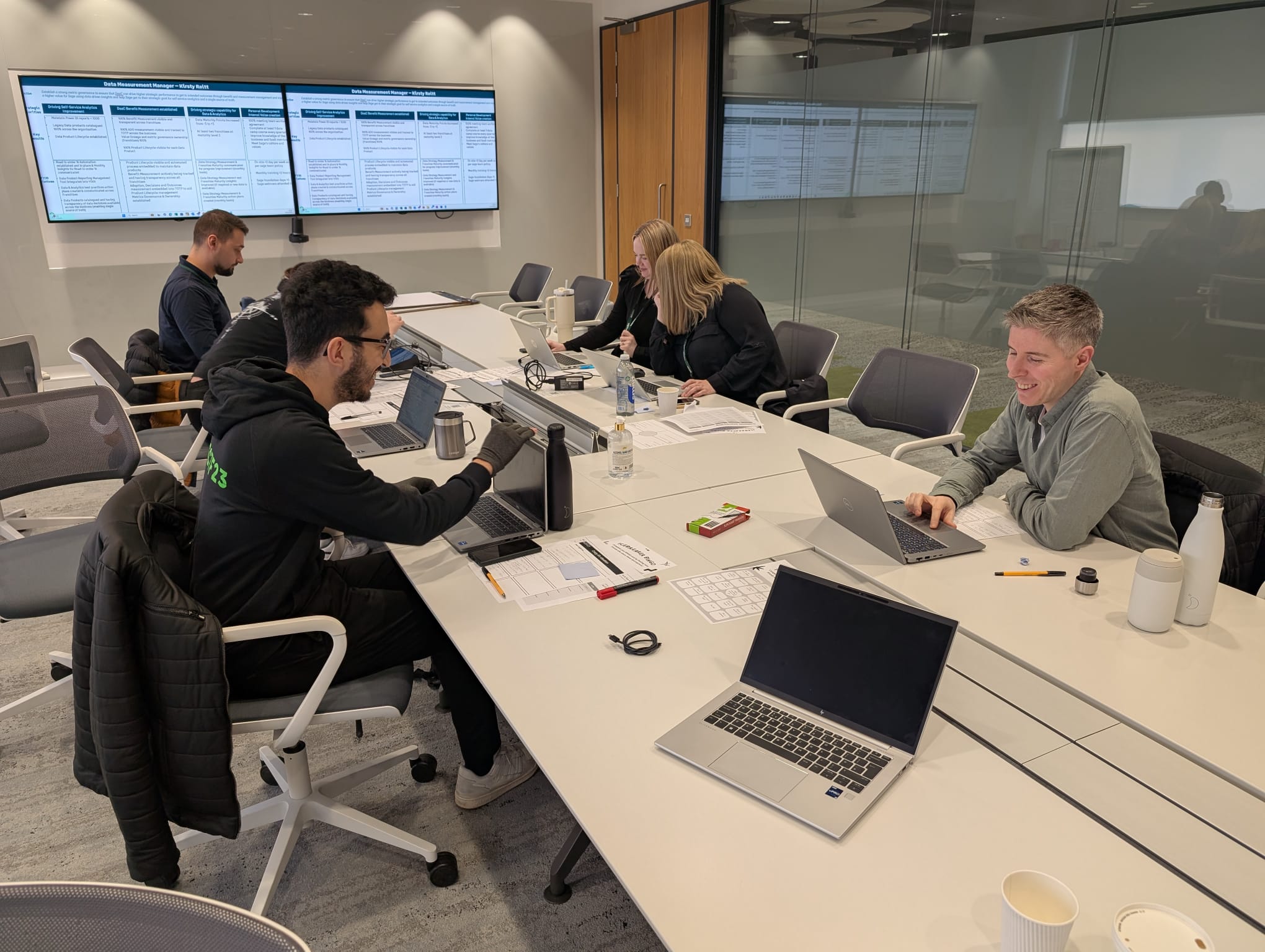
Volunteers were split into two teams aligned with their skill sets. Group 1 partnered with Newcastle United Foundation, focusing on IT systems including cybersecurity, system integration, and database management. Group 2 worked with Young Enterprise, tackling challenges related to data management, data analysis, and machine learning.
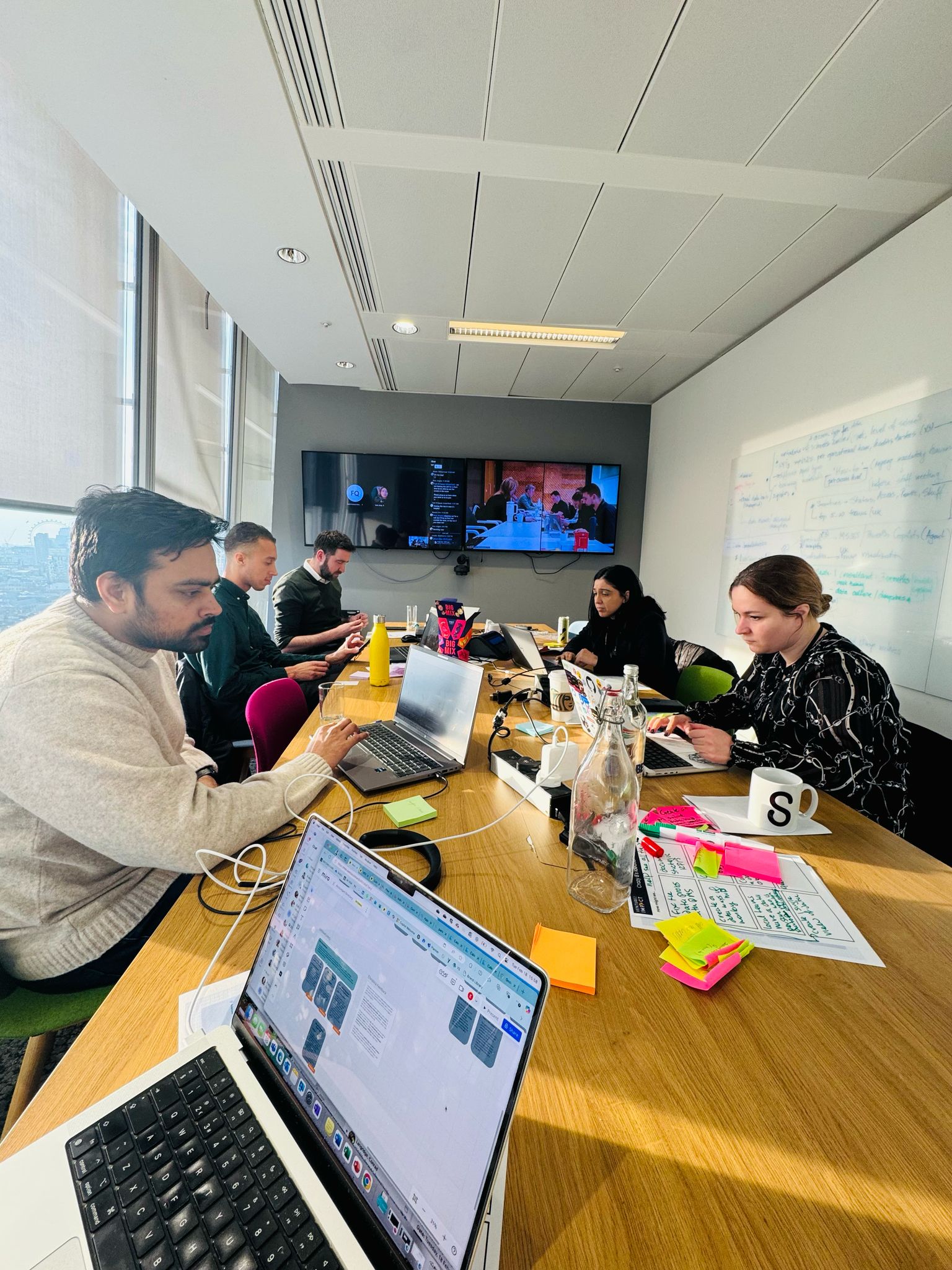
The day began with each nonprofit presenting their “How Might We” (HMW) statements and challenge contexts, setting the foundation for a shared understanding of the goals. Volunteers then engaged with nonprofit staff during a live Empathize session, followed by a SWOT analysis to assess current systems and pain points.
Using Crazy 8’s, volunteers generated a wide range of potential solutions. Ideas were shared, grouped into thematic categories, and refined through small-group discussion. Teams then voted on the most promising concepts and developed them into “napkin pitches”—concise, creative, and actionable recommendations.
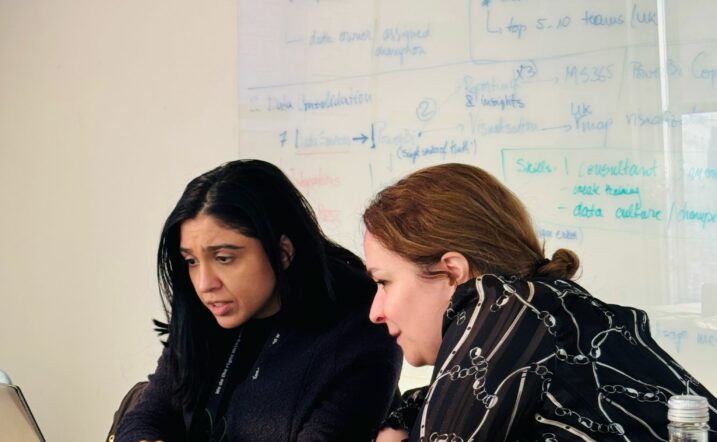
Each group presented their napkin pitches to nonprofit representatives, who provided feedback and asked clarifying questions. The deliverables included 3–4 detailed, actionable recommendations presented in napkin pitch format. Each recommendation focused on AI-driven solutions and data automation tools, specifically tailored to help Newcastle United Foundation and Young Enterprise enhance data management, platform integration, and internal communications to optimize operations and support sustainable growth.
The session concluded with a reflection and post-project survey to assess impact and gather learning insights. This collaborative sprint fostered innovative, practical solutions that each organization can now explore further to strengthen their digital and data capabilities.
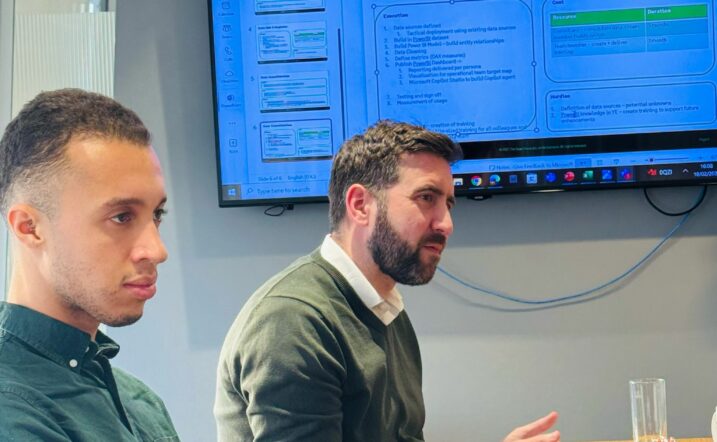
ANTICIPATED Impact
By leveraging AI-driven strategies developed during the design sprint, both Newcastle United Foundation and Young Enterprise are positioned to significantly enhance their operational efficiency and long-term sustainability. For Newcastle United Foundation, implementing a centralized internal communications system supported by AI will streamline cross-department collaboration, improve information flow, and enable the organization to scale its operations more effectively as demand grows. For Young Enterprise, integrating AI-powered data management tools will empower the organization to organize, analyze, and align their data more strategically, enhancing decision-making, tracking progress toward SDG-related goals, and increasing their ability to measure and communicate impact. These improvements will not only strengthen each organization’s internal capacity but also expand their ability to deliver meaningful, measurable outcomes for the communities they serve.
outcomes
These innovations resulted in the following outcomes:
- Development of actionable AI-driven solutions to streamline internal communications at Newcastle United Foundation, including the proposal of a centralized system to improve collaboration across departments and support organizational growth.
- Identification of targeted AI tools and data automation strategies for Young Enterprise, enabling more efficient data organization, analysis, and alignment with strategic priorities such as Sustainable Development Goals (SDG) tracking.
- Increased confidence among nonprofit staff in leveraging digital tools for operational efficiency, with clear, step-by-step recommendations presented in napkin pitch format that can be implemented in the short to medium term.
New Castle Foundation members
The following outcomes and insights are derived from responses collected through our feedback form. The responses indicate that New Castle Foundation members have:
- Identified their target audience for internal communications, explored barriers to effective engagement, and discussed strategies for measuring impact through open rates and user interaction.
- Surfaced new technology solutions—including tools already available within their organizations—that had previously been underutilized, opening up fresh opportunities to enhance communication and operational efficiency with existing resources.
Young Enterprise members
In addition, the responses indicate that Young Enterprise members have:
- Increased awareness and understanding of how emerging technologies can support nonprofit operations. Participants gained valuable insights into a range of data visualization options, enabling them to better interpret and present information for strategic decision-making.
- Obtained a practical introduction to AI tools and capabilities, helping staff explore how automation and artificial intelligence can be integrated into their workflows to enhance efficiency and impact.
Feedback
From our Partner
FROM Newcastle United Foundation
FROM Young Enterprise
FROM the volunteers
by the numbers...
Volunteers
- 90% of respondents felt satisfied with the design sprint process overall
- 60% of respondents felt that their communication skills improved significantly.
- 71.4% of respondents would participate in future volunteer programs
- 85.8% of respondents felt that their Cross-Sectoral Collaboration skills improved strongly.
- 85.8% of respondents felt that their innovation skills improved significantly.
- 57.1% of respondents felt that their leadership skills developed moderately.
- 100% of respondents felt that their communication skills increased.
- 57.2% of respondents felt that their creativity was greatly enhanced.
- 100% of respondents felt that their presentation and public speaking skills improved considerably.
Sage
- 100% of respondents rated their likelihood to recommend V2I to other organizations
- 100% of respondents felt that the volunteer program was highly effective in achieving their goals for engaging employees in impactful volunteer programming.
- 100% of respondents felt that the volunteer program was highly effective in achieving their corporate impact goals.
Young Enterprise
- 100% of participants felt the final recommendations were highly relevant
- 100% of participants expressed high confidence in implementing the recommendations.
- 100% of participants reported an improvement in understanding their target audience.
- 100% of participants felt their knowledge of their data challenge was enhanced.
- 100% of participants felt design sprint significantly strengthened the relationship between Young Enterprise and Sage
- 66.7% of participants estimated it would take 4 weeks or more to complete the work themselves.
- 100% of participants were satisfied with the design sprint process overall.
Newcastle United Foundation
- 100% of participants felt the final recommendations were highly relevant
- 100% of participants expressed high confidence in implementing the recommendations.
- 100% of participants reported an improvement in understanding their target audience.
- 100% of participants estimated it would take 4 weeks or more to complete the work themselves.
- 100% of participants were satisfied with the design sprint process overall.
